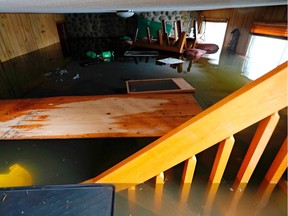Fariha Naqvi-Mohamed: Allow flood victims to dip into their RRSPs
A petition asks that those who have the means be allowed to, in effect, lend themselves their own money to help them rebuild or relocate.

Article content
As much of a nightmare as the floods of 2017 were to live through, the ongoing horror that some survivors are still experiencing is arguably worse. Almost an entire year after the floods that ravaged Pierrefonds, Rigaud, Gatineau and other communities in the western part of Quebec, some families remain in hotel rooms, living with relatives or relying on aid. They are exhausted in every sense of the word. All they want now is their home.
While the wheels of bureaucracy turn frustratingly slowly, there is one proposed measure that could help get them back on their feet: More than 600 people have signed a petition calling on the government to allow victims of natural disasters to use money from their Registered Retirement Savings Plan to rebuild or relocate, without penalty. The petition called “upon the Minister of National Revenue to amend the law governing RRSPs so that anyone who has experienced a natural disaster such as a tornado, fire, flood or earthquake can withdraw their RRSP without being subject to taxation, penalties or a maximum withdrawal amount, and that the repayment period shall be 15 to 20 years, retroactive to May 6, 2017.” This would be similar to the first-time home buyers plan.
That initiative deserves support. Those who have the means should be allowed to, in effect, lend themselves their own money from their retirement savings.
Families have lost their homes, photo albums and childhood keepsakes. Entire families were rescued in canoes. These are homeowners who had worked hard for their nearly half-million dollar properties (in some cases), and paid taxes on them. However, their insurance policies generally did not cover this kind of flooding. In some cases, their properties have been rezoned and they are not allowed to rebuild. Government compensation cheques have generally covered a fraction of the value of their homes — one-quarter for those who are lucky. In other cases, family homes that may eventually be rebuilt sit wrecked, frozen and in disrepair, partly as a result of red tape.
Even for the luckier flood victims, the experience has been traumatic. I remember the shrill fear in my sister’s voice when she called me last May. She told me the water level was rising fast and that the firefighters had warned them to get out. She sent her kids to stay with family while she and her husband stayed behind to help save their own house and the houses of their neighbours. Almost every home on my sister’s street got flooded. Some were complete writeoffs, others just a mess. Thankfully, strategically placed sandbags, fantastic volunteers and divine intervention kept her own home mostly dry. Others were not quite so lucky.
In the months that followed, driveways in her Pierrefonds neighbourhood were littered with construction dumpsters, the way most driveways would otherwise be filled with children’s bikes on a warm summer day.
As the weeks went by, stories of heroism, loss, sadness and triumph emerged. We heard of strangers helping strangers, we heard of volunteers filling sandbags, and so much more. Our city came together as one can only do in times of crisis and we stood shoulder to shoulder with our neighbours in need.
Millions have been raised for flood relief, government money has been put aside and fundraiser upon fundraiser has been held. It is mind-boggling to know that there are still many families that have yet to see much if any of those funds. Tens of millions of dollars are sitting earmarked for flood victims, yet families continue to suffer.
It should not solely be up to the government or for charitable citizens to foot the bill when we’re dealing with the devastation of this magnitude, however. Allowing homeowners to dip into their own hard-earned cash should be part of the response.
Fariha Naqvi-Mohamed is the founder and editor in chief of CanadianMomEh.com, a lifestyle blog.








Postmedia is committed to maintaining a lively but civil forum for discussion. Please keep comments relevant and respectful. Comments may take up to an hour to appear on the site. You will receive an email if there is a reply to your comment, an update to a thread you follow or if a user you follow comments. Visit our Community Guidelines for more information.